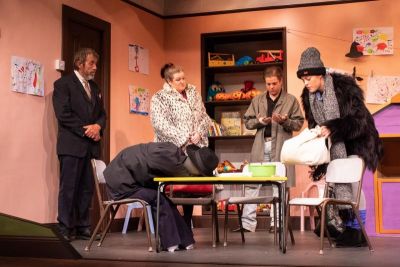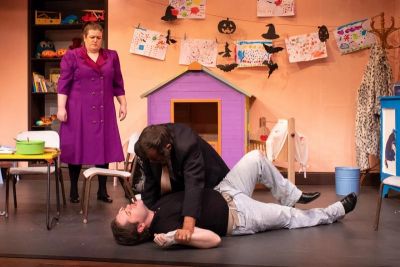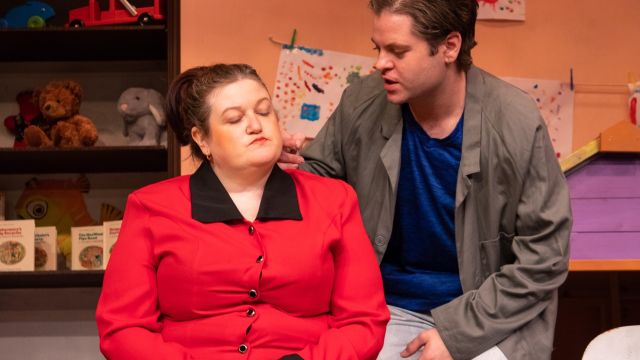Groping for Words
Set in a small creche within an old school building, a middle-aged woman takes on an Adult Literacy class. Initially, just two students reluctantly turn up: Thelma, a young nanny, and George, who is living in a hostel, but the acting school caretaker, Kevin, is also taking an interest in what’s happening in the classroom.
Tea Tree Players’ current play is written by Sue Townsend, an English author best known for her books and TV shows on “The Secret Life of Adrian Mole” and “The Queen and I”. Her stories were always set in disadvantaged situations, and this play is no different.
Joyce is the wife of a doctor in a stale marriage, looking to give something back. Danni Fulcher plays her as a careful, stable woman, initially frustrated by the differences in others’ attitudes and behaviours, but patiently accepting – even exploring – how others live. Danni’s performance is sympathetic, communicating her desire to help, even whilst showing a certain naivety to the ways of the world beyond her husband’s dinner parties.
Thelma is a young nanny, essentially slave labour in a rich couple’s house, who insist she read to their child. Newcomer Keyarra Maur brings the right combination of streetwise and innocence to the role. She has some of the best lines, where the audience is laughing out loud at her character’s mistaken choice of words. Thelma’s costumes, lurid Lycra and legwarmers, are for the aerobics class that her employers think she’s attending but are also a reminder of the period this is set: Thatcher’s 1980s Britain.
 George Humphries plays the homeless father (also George) who lost his wife to another man and also his job when his sympathetic employer died. He turns up at the school hoping to find someone to read the letter his daughter sent him from Australia. He is old-fashioned polite, smartly dressed even when they’re his only clothes, and he’s living in the classroom’s Wendy house. Humphries is strongest when he’s funny – when he tries to wash himself using the water from the goldfish bowl, it’s both humorous and desperately sad.
George Humphries plays the homeless father (also George) who lost his wife to another man and also his job when his sympathetic employer died. He turns up at the school hoping to find someone to read the letter his daughter sent him from Australia. He is old-fashioned polite, smartly dressed even when they’re his only clothes, and he’s living in the classroom’s Wendy house. Humphries is strongest when he’s funny – when he tries to wash himself using the water from the goldfish bowl, it’s both humorous and desperately sad.
Kevin is the acting head caretaker, who bluffs and brags his way through the job he inherited by default. Samuel Creighton lends considerable weight to this character, his roughness so ingrained that the moments where he’s nice have to be balanced by something more horrible – but even through this, there are subtleties in his struggle that keep the audience on-side.
Silvia Bolingbroke brings these four together and directs them sympathetically, positioning all of them effectively on stage, even when the action is focused on just one or two of them. The director’s set design is great, with three distinct areas on the tight stage effectively divided using a little scenery and Robert Andrews’ lighting design. The stage itself is wonderfully dressed, full of detail on the shelves and cupboards, a magnificent Wendy house and children’s pictures hanging on the back wall (painted by the Reception class of Paralowie R-12 school).
 All these people are full of pride and embarrassment – finding excuses amongst themselves as to why they can’t read or write: they’ve left their glasses at home, a ferret bit the hand I use to hold a pen – and even Joyce is reluctant to talk much about her more privileged background. This is a story of a society that would use the disabilities of its people against them – and once all four of these individuals are relieved to have someone else to talk to, there’s a deeper anger welling up, which only really finds a voice in the final scene.
All these people are full of pride and embarrassment – finding excuses amongst themselves as to why they can’t read or write: they’ve left their glasses at home, a ferret bit the hand I use to hold a pen – and even Joyce is reluctant to talk much about her more privileged background. This is a story of a society that would use the disabilities of its people against them – and once all four of these individuals are relieved to have someone else to talk to, there’s a deeper anger welling up, which only really finds a voice in the final scene.
The setting of this story during a time of significant change and unrest in the UK is now showing its age a little, particularly in its language and how it deals with a sexual assault, but the challenges of adult illiteracy remain, so this still stands as an exploration of their struggles, frustrations and society-imposed limitations.
Mark Wickett
Subscribe to our E-Newsletter, buy our latest print edition or find a Performing Arts book at Book Nook.

